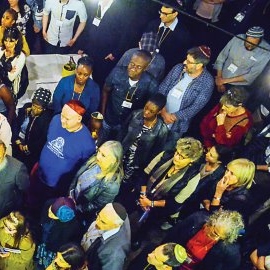
Featured Item

Israeli millennials seek intimate dialogue with the divine
MIRAH LANGER
“So-called ‘seekers’ are young Israeli men and women who position themselves between being religious and irreligious,” he told Limmud last weekend. “Their consideration of themselves as ‘spiritual’ is carving away at this dichotomy of secular and religious.”
The occupation of an in-between “loose space” is particularly interesting for the Israeli Jewish community, he suggested. Owing to the country’s secular socialist Zionist origins, it had always maintained quite a severe divide between secular and orthodox sectors.
Engelberg, a Hadassah Academic College staff member and lecturer at both Tel Aviv and Hebrew Universities, provided brief case studies of some of the people in their 20s and 30s he had interviewed for his study.
One 30-something-year-old woman who was raised secular later became devoutly religious during a romantic relationship. However, by the time of her interview, she had left this religious society. Nevertheless, instead of returning to a secular identity, she now classified herself as “religyosit” – her take on the spiritual classification.
The woman said her self-definition represented the belief that while there was “a truth that was singular”, the world itself is one of division as characterised by Kabbalistic concepts. Thus, people are able to view only various reflections of this truth
It is interesting to note that even Israelis who identify as religious are able to embrace this postmodern idea of a plurality of possible religious truths.
Engelberg cited the example of a 20-something-year-old woman who described herself as religious, yet asserted that her university studies had taught her that “other people choose to live differently, and that’s also okay. There’s no good and bad; there’s no sin here; just choices.”
The shift is clear in that both women don’t show concern with ideas of religious authority or laws, instead, they are prioritising a path of personal truth-seeking.
Engelberg said that while in the past, G-d was seen as a judge and certainly not a “buddy”, millennials now seek a more personal and intimate relationship with this figure of their faith.




